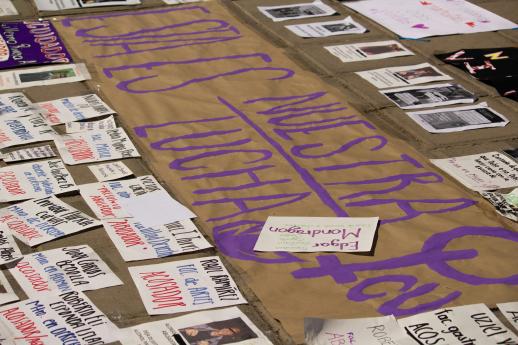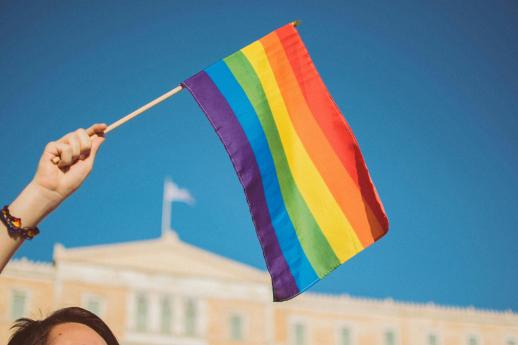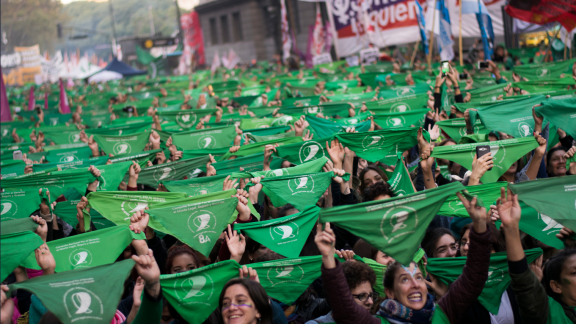The recent inauguration of the ultra-right-wing Argentinian President Javier Milei is a stark reminder of the fragility of our rights to our own bodies.
Within a week of taking office, the self-described libertarian, who is openly anti-abortion and sexist, slashed the number of government ministries in half and delivered on his promise to eliminate the Ministry of Women, Gender and Diversity in the name of austerity. Although Milei's definitive plan for the newly formed and arbitrarily named ‘Ministry of Human Capital’ is not yet known, his famous phrase "there is no money" is a clear signal that sexual and reproductive health, rights and justice will not be on the agenda.
Milei has said so himself: he has vowed to hold a plebiscite on whether to repeal the country’s 2020 landmark legislation of abortion, has attacked the 2006 law which recognizes’ students’ right to comprehensive sexuality education, routinely portrays LGBTIQ+ people as a menace to Argentinian society and denies the existence of the gender gap.
But the need for a robust and well-funded public health service in Argentina, one that provides integrated sexual and reproductive healthcare services, is of vital public interest.
when
country
Argentina
region
Americas & the Caribbean
Subject
Abortion Care, LGBTI+
Related Member Association
Fundacion Derechos Humanos Equidad y Genero (FunDheg) - Argentina

A feminicide every 35 hours
Rubí Salgado (@rubisalgado)/UnsplashIn 2022, the Argentine justice system registered a femicide every 35 hours, totalling 252 victims. Adolescent mothers make up 11.5% of all births. One in three women across Argentina have been subjected to violence on social media against the backdrop of the abortion debate. Many of Argentina’s 23 provinces do not incorporate legislation to eliminate inequalities and gender-based violence. Even where protective policies and services do exist, they remain inaccessible to marginalized people.
It has been more than forty years since the restoration of democracy in Argentina, and 75 years since the Universal Declaration on Human Rights. But today, the Milei government’s hostility to sexual and reproductive health and rights and its aims to enact regressive policies threaten to undo years’ worth of hard work and progress in realizing our most intimate rights.
Milei and his allies’ hateful, racist, misogynist and xenophobic comments, expressed online and in the streets, represent a risk for peaceful coexistence and hinder the work of human rights defenders and organizations such as ours that work on a daily basis for sexual and reproductive health and rights. It is therefore crucial that we double down on our efforts to mobilize at local, regional and global levels to defend these hard-won rights.
As a start, the national provision of sexual and reproductive health commodities, including contraceptives, hormone replacement therapy, and the abortion pill, must be guaranteed. Earlier this year, Argentina green lit the use of mifepristone, part of a two-pill abortion regimen that includes misoprostol, in a shift towards expanding reproductive rights since the legalization of abortion. These pills must be available and accessible to all.
Further to this, while comprehensive sexuality education has been mandatory in all schools in Argentina since 2006, many young people around the country still have no access to basic knowledge of their sexual rights. And the majority of teachers who take on these roles are unpaid. To prevent violence and protect human rights, teachers, students and feminist organizations like IPPF’s member association in Argentina, Fundación Derechos Humanos Equidad de Género (FundDheg), need funding and support to continue delivering and expanding on this vital curriculum.

The rights of LGBTIQ+ people are at risk.
Stavrialena Gontzou/UnsplashThe rights of LGBTIQ+ people are also at risk. Argentina already has some of the world’s most progressive trans rights legislation, when, in 2012, it became the first country in the world to let trans people change their legal gender without requiring a judge's permission or medical interventions. The “trans labor quota” is another law that reserves 1% of public sector jobs for transgender people, providing them access to comprehensive health care and other benefits. But one of Milei’s newly elected lawmakers, Ricardo Bussi, has criticised this law, signaling a threat to its repeal that will only deepen the existing inequalities many trans people in Argentina face. We must continue to draw attention to the voices and lived experiences of trans people in Argentina to build evidence and support for these laws.
Milei’s economic policies as a self-described “anarcho-capitalist” will disproportionately impact women, youth and marginalized groups, who have already suffered under the country’s crippling and ongoing economic crisis. Slashes to public spending on health and education, two highly feminized sectors, will directly and disproportionately impact Indigenous, migrant and low-income women and girls. According to data provided by the Ministry of Women, 64% of low-income households are headed by women, who earn 28.1% less than men on average. Women’s unemployment rate is 7.8% compared to 6.1% for men. A robust public education and healthcare sector can provide equal job opportunities to women, empowering them to better care for themselves and their families.
At the IPPF Americas and the Caribbean Regional Office, we work to ensure a world where all people have control over their own bodies and their futures. Together with FundDheg, we have celebrated the many victories for gender equality and reproductive rights in the country.
In addition to the landmark decision to legalize abortion, Argentina passed a bill in 2022 to shift the country's biomedical approach to health to one more focused on gender and human rights. This, in part, means eliminating stigma and discrimination against people living with HIV or other sexuality transmited infections and ending the criminalization of HIV exposure or transmission. In doing so, Argentina has set an example in the region by implementing the policies emanating from the 1994 International Conference on Population and Development Program of Action, which called on countries around the world to make women's rights and sexual and reproductive health a central theme in national and international economic and political development efforts.

But years of sustained advocacy work from women’s rights groups in Argentina are now at risk of unraveling with the election of one man, with a core constituency of mostly other men, who seeks to return Argentina to a status quo of intolerance of gender diversity, hindering the vital work of advocates and organizations that defend and promote sexual and reproductive health, rights and justice.

Repealing the abortion law would negate the lived experiences of Argentine women, evidence-based public health policies and international agreements. Discrediting comprehensive sex education will harm children, who will be woefully ill-equipped in understanding and respecting their own and other’s sexual and reproductive health and rights. Reversing a law that transforms everyday life for transgender people will further entrench existing inequalities. And eliminating a government ministry that protects and counsels victims of gender-based violence will only perpetuate a cycle of violence that too many have known for too long.
In the face of rising extremism and opposition to sexual and reproductive health and rights in Latin America, and around the world, it is crucial that we unite to protect these human rights and freedoms that have taken us decades to achieve. We must not allow these freedoms to be compromised by extremists who shore up political power by deploying stigma, fear and hate-speech against those seeking and those providing and advocating for sexual and reproductive health services.
At IPPF, we do not let the opposition define us. Fears of setbacks do not mean we must cower and retreat from our powerful feminist movement in silence. Rather, we will continue to stand up and speak out in violation of our rights, and in solidarity with millions of Argentinians who demand a better future for themselves and their children. In the face of adversity, we will continue to channel the spirit of the tens of thousands of Argentine women who organized, mobilized and took to the streets to support a person's right to choose, and who, by their example, inspired activists across Latin America and the Caribbean. May they give us strength and resilience to push through - for all of us.
By: Eugenia Lopez Uribe, Regional Director for IPPF in the Americas and the Caribbean, in collaboration with FunDheg
Banner credits: Laura Rivas/Shutterstock











